

Whit Dickey. Souvenir of the Lost World of the New York Jazz Club. Jazz Standard on East Twenty-Seventh Street, between Park and Lexington, was a hell of a good club, my favorite in Manhattan.
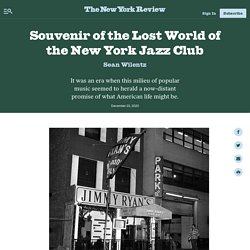
This is saying a lot, because there are several fine jazz clubs in New York, the undisputed jazz capital, most of which are barely hanging on today, just as the Standard was, their owners praying that the Covid-19 vaccine will finally bring back the city’s nightlife. It all became too much for the Standard’s owners, who announced on December 2 that, in view of lost revenues and a stalemated rent negotiation, they were forced to close the club. The Standard was laid out beautifully, rows of tables set perpendicular to the bandstand, a comfortable bar near the entrance, and what felt like an entire space of its own stage left, where well-connected (or just fortunate) patrons could spread out a little at their tables. Ivy Style. I was in the middle of a long moving process when I decided to go through some boxes and pull out my favorite albums.

I soon realized that I hadn’t sat down and really listened to music in quite some time. When I discovered jazz in college, I would finish my classes, return to my dormitory and sit on the couch with the speakers facing me, close my eyes, and listen to one or two albums in full. It wasn’t mere background music, and I realized that lately that’s exactly what it had become. So one by one I went back and really listened to some of my favorites:
Billy Eckstine - There's A Small Hotel (From On Your Toes) - MERCURY 126 066. Music: Chet Baker & Paul Bley - 'If I Should Lose You' - Attention to the Unseen. Music: Stacey Kent - 'The Changing Lights' - Attention to the Unseen. This Bluesy Orchestral Cover of Pearl Jam's "Black" will Stir Your Soul. Charlie Parker foreshadowed free jazz on this fantastic 1948 track with Miles Davis. Charlie Parker foreshadowed free jazz on this fantastic 1948 track with Miles Davis In the liner notes for an upcoming Charlie Parker box set, jazz journalist Neil Tesser writes that one of Bird’s songs suggests a style of music that wouldn’t emerge for over a decade: “…the gravity-defying ‘Constellation,’ which, with its barely sketched melody and supersonic tempo, seems to anticipate the free-jazz energy solos of the 1960s.”
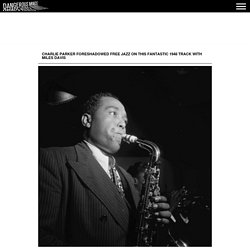
Charlie Parker is one of the most influential figures in jazz, though it’s safe to say that most don’t think of the alto saxophonist in relation to the avant-garde subgenre. While one can understand how his improvisational style generally inspired the foremost free jazz musicians, it’s another thing to come to that conclusion when listening to a particular Parker track. “Constellation” was recorded by Parker’s quintet in 1948 and released on a single by Savoy Records.
Pianist Hal Galper and his quintet covered “Constellation” on the 1999 album, Let’s Call This That. Stacey Kent. Stacey Kent (born March 27, 1965) is an American jazz singer.[1] Kent often sings in French and was awarded the Ordre des Arts et des Lettres (Order of Arts and Letters) by the French Minister of Culture in 2009.
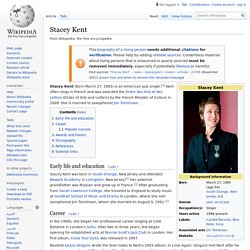
She is married to saxophonist Jim Tomlinson. Early life and education[edit] Stacey Kent was born in South Orange, New Jersey and attended Newark Academy in Livingston, New Jersey.[2] Her paternal grandfather was Russian and grew up in France.[3] After graduating from Sarah Lawrence College, she traveled to England to study music at Guildhall School of Music and Drama in London, where she met saxophonist Jim Tomlinson, whom she married on August 9, 1991.[1] Career[edit] Novelist Kazuo Ishiguro wrote the liner notes to Kent's 2003 album, In Love Again.
How Dave Brubeck's Time Out Changed Jazz Music. Music video essay maestro Polyphonic is back.
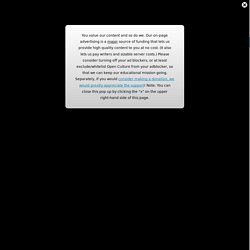
What I dig about his videos is that he takes on some of the true warhorses of modern popular music and manages to find something new to say. Or at least he presents familiar stories in a new and modern way to an audience who may be hearing ELO, Queen, or Neil Young for the first time. His latest upload explores Dave Brubeck’s groundbreaking jazz album Time Out. This is an album that regularly tops best-of lists, gets reissued constantly, and is so ubiquitous in some circles that it’s hard, like Led Zeppelin’s fourth album, to hear the album with fresh ears.
Miles Davis Iconic 1959 Album Kind of Blue Turns 60: Revisit the Album That Changed American Music. No amount of continuous repeats in coffeeshops around the world can dull the crystalline brilliance of Miles Davis’ Kind of Blue one bit.
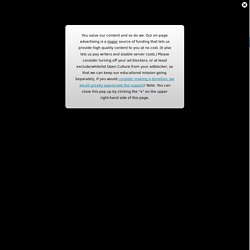
The album turned 60 three days ago, and it still stands as one of the most influential albums, jazz or otherwise, of all time… indeed, as “one of the single greatest achievements in American music.” So says one of several critics praising the album in the introduction to an interview with Ashley Kahn, author of Kind of Blue: The Making of the Miles Davis Masterpiece. Kind of Blue is a “cornerstone record, not only for jazz. It's a cornerstone record for music,” says another critic. Blossom Dearie - I Won't Dance. On London Bridge (1956) - Jo Stafford. Lester Young &Coleman Hawkins 1958.
Moanin' - Art Blakey & the Jazz Messengers - Live. Miles Davis - So What. When a Jazz Musician Shook Up Classical Music. A racially mixed audience settled into the red velvet seats of Carnegie Hall, their faces gazing up at the gilded proscenium in a mirror image of the orchestral piece they were about to hear: Duke Ellington’s “Black, Brown and Beige.”

It was Jan. 23, 1943, and segregation was at its height, even in cosmopolitan New York City. Things We Like - Jack Bruce. John McLaughlin: Extrapolation. If you were looking for one John McLaughlin record you might play for a curious friend, this would be the one.
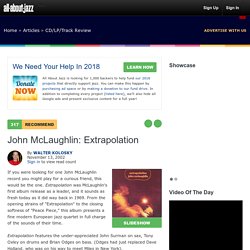
Extrapolation was McLaughlin's first album release as a leader, and it sounds as fresh today as it did way back in 1969. From the opening strains of "Extrapolation" to the closing softness of "Peace Piece," this album presents a fine modern European jazz quartet in full charge of the sounds of their time. Extrapolation features the under-appreciated John Surman on sax, Tony Oxley on drums and Brian Odges on bass. (Odges had just replaced Dave Holland, who was on his way to meet Miles in New York). North America's Best Jazz Clubs. Jazz music is one of America’s great art forms, a musical blend of cultures — West African rhythms, elements of spirituals and the blues, and America’s marching band instruments, brass and reeds — that evolved throughout the 20th century.

Its blooming spread across the nation. Jazz started off as a type of dance music played by self-taught instrumentalists in New Orleans, which was performed in brothels and bars. As the genre transitioned from the red light to the spotlight, Chicago became a hotbed for jazz in the North, turning out many great bandleaders, and Kansas City grew in reputation as the genre transitioned from swing to bebop.
New York City became a new center for jazz by the mid-century, but by that time, popular clubs had popped up in most major cities. Harmonies and rhythms are an integral part of jazz, but equally important is the spontaneity. Jazz venues aren’t cavernous concert halls. Criteria for Inclusion: Choosing the “best” of anything will always lead to debate. Joe Locke's Essential Jazz Listening. Joe Locke is a renowned jazz vibraphone player who has recorded with everyone from Grover Washington Jr. and Kenny Barron to the Münster Symphony Orchestra and the Beastie Boys.

The Jazz Journalists Association presented Locke the “Mallet Player of the Year” award in 2006, 2008 and 2009, and he has won Golden Ear Awards for “2005 Concert of the Year” and “2007 Concert of the Year.” Locke, the son of a classics professor, was raised in Rochester, New York and learned to play piano and drums at an early age. By the time he was 13, Locke had taken up vibraphone and during his teens, he studied with pianist Phil Markowitz and bassist Steve Davis. Gilad Hekselman's Essential Jazz Listening. Jazz guitarist Gilad Hekselman has created quite a buzz in the jazz community.
In 2004, he arrived in New York, a student in his early twenties who had just received the America-Israel Cultural Foundation Scholarship to attend The New School in New York. In 2005, Hekselman won the Gibson Montreux International Guitar Competition and the following year, he opened for legendary flamenco player Paco de Lucia at the Montreux Jazz Festival. John Coltrane Quartet - Impressions. Jack Bruce - Over The Cliff. JACK BRUCE upright bass "over the cliff" things we like live. Judith Owen - In the Summertime. Our Point Of View At Le Poisson Rouge. The 2014 NPR Music Jazz Critics Poll : A Blog Supreme.
Steve Lehman edged out Wadada Leo Smith for the top spot in the 2014 NPR Music Jazz Critics Poll. Willie Davis/Courtesy of the artist hide caption itoggle caption Willie Davis/Courtesy of the artist Steve Lehman edged out Wadada Leo Smith for the top spot in the 2014 NPR Music Jazz Critics Poll. Willie Davis/Courtesy of the artist NPR Music is pleased to present a poll in which 140 jazz critics picked their favorite recordings of 2014. For nine consecutive years, this poll has been a labor of love by eminent critic Francis Davis. Revive Big Band At Berklee. Interview: Herbie Hancock, Musician And Author Of 'Possibilities' Herbie Hancock's new memoir is titled Possibilities. Jessica Hancock/Courtesy of the artist hide caption itoggle caption Jessica Hancock/Courtesy of the artist. To Miles, From Wayne. Frank Sinatra - Young at Heart (HQ, 720p, lyrics)
Frank Sinatra - That's Life. Frank Sinatra- I've got you under my skin. Frank Sinatra - Come Fly With Me. Frank Sinatra - The Way You Look Tonight Original. Frank Sinatra - I've Got the World on a String. Frank Sinatra - Witchcraft. Sarah Vaughan - Lullaby of Birdland. There's a Small Hotel. Blossom Dearie - I Walk a Little Faster. Blossom Dearie - Manhattan. 'Lush Life,' a Self-Portrait in Song. An analysis of Miles Davis's Kind of Blue. What is a classic album? Not a classical album – a classic album. One definition would be a recording that is both of superb quality and of enduring significance. I would suggest that Miles Davis’s 1959 recording Kind of Blue is indubitably a classic. It presents music making of the highest order, and it has influenced — and continues to influence — jazz to this day.
There were several important records released in 1959, but no event or recording matches the importance of the release of the new Miles Davis album Kind of Blue on 17 August 1959. But popularity or commercial success do not correlate with musical worth, and it is in the music on the recording that we find both quality and significance. The pianist here is Bill Evans, who was new to Davis’s band and a vital contributor to the whole project.
Evans makes his mark throughout the album, though Wynton Kelly substitutes for him on the bluesier and somewhat more traditional second track “Freddie Freeloader.” Saxophone (Coltrane) Rhythm a Ning Art Pepper quintet. Art pepper quartet live the trip live video. Ella Fitzgerald - Remind Me (the Jerome Kern songbook) Blossom Dearie - Thou Swell. Blossom Dearie - Just One of Those Things. Blossom Dearie - Manhattan. Blossom Dearie - I wish you love + Impro blues (Live french TV 1965) Patrick McGoohan drum solo. Ink Spots - If I Didn't Care. Hitler’s Very Own Hot Jazz Band. Lush Life - Hartman & Coltrane. Cannonball Adderley: 5 Songs From A Joyous Soul : A Blog Supreme. Hide captionCannonball Adderley. Lena Horne - Stormy Weather (1943) Jeff Beck - How High the Moon.
Mahavishnu Orchestra Live at BBC 1972. Shirley Bassey - Big Spender. Peggy Lee & Benny Goodman Sext - Where Or When. S Late Night Music Club with Blossom Dearie.